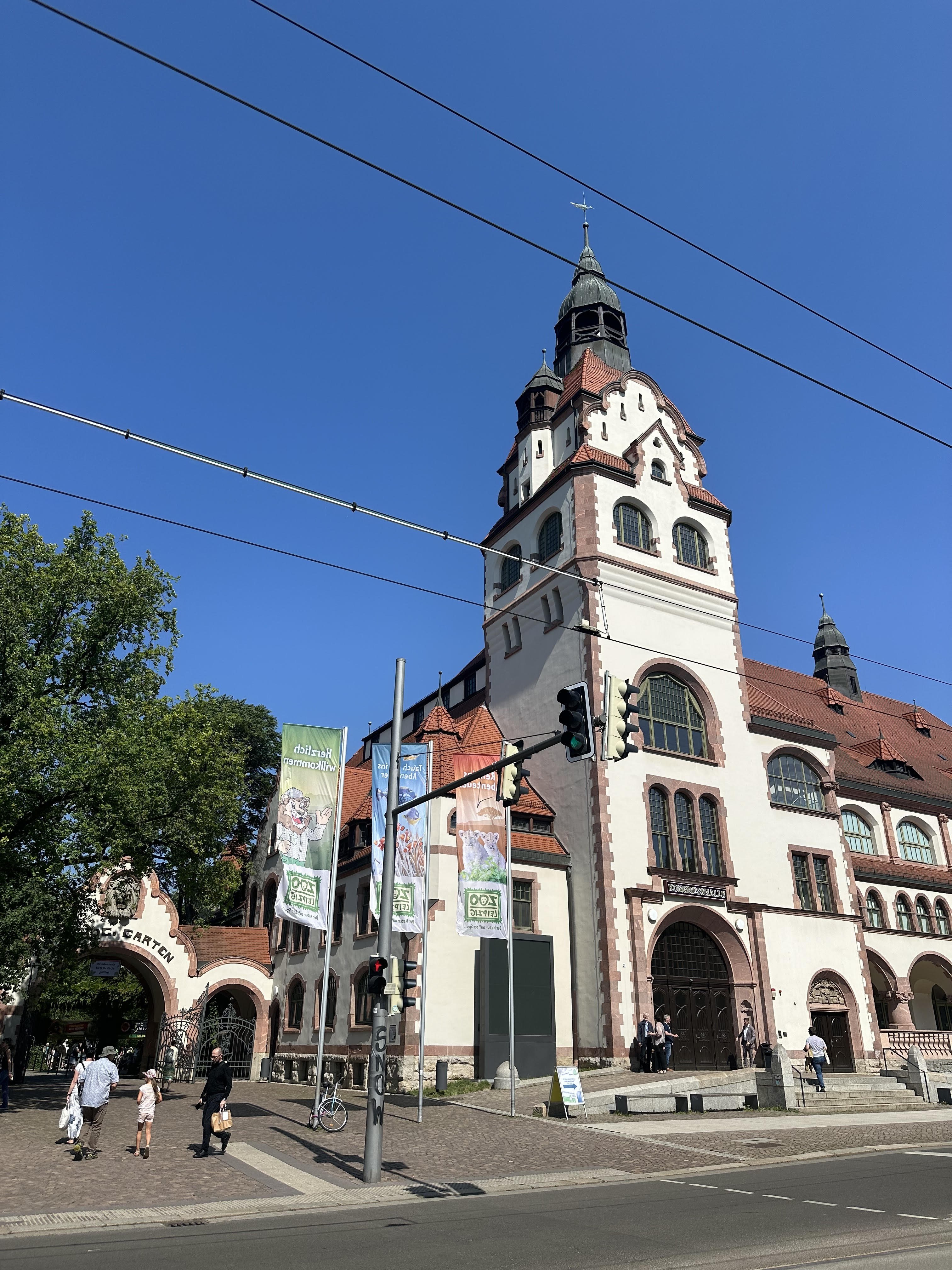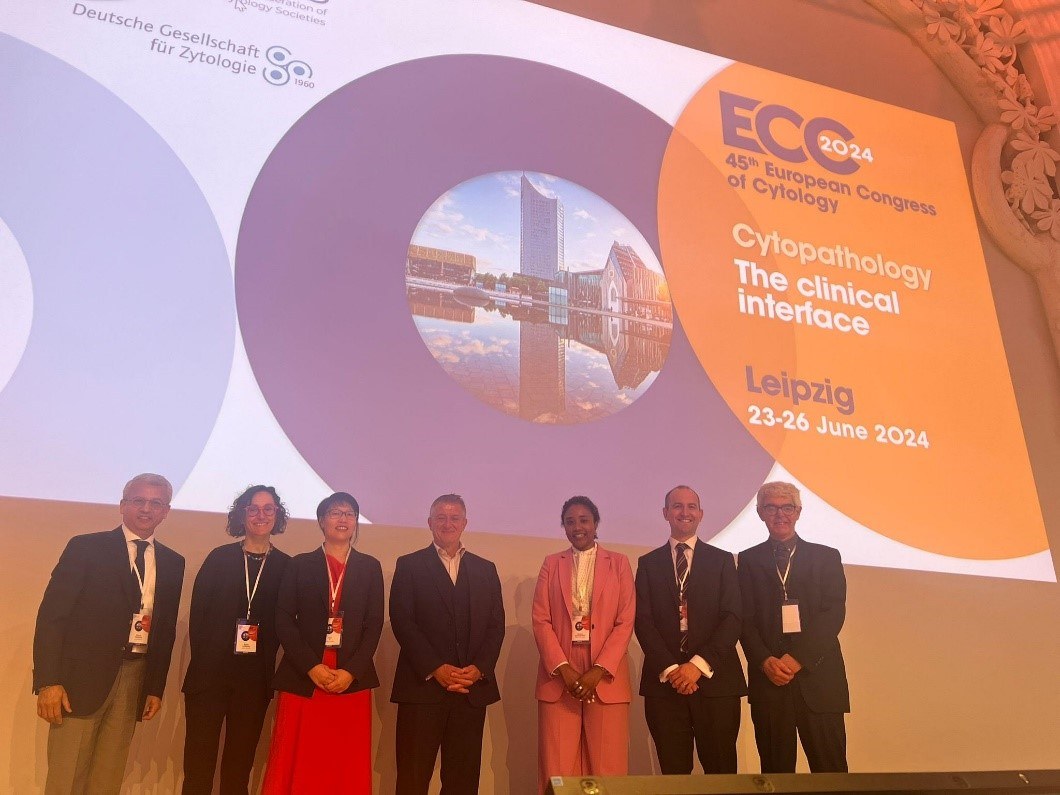45th European Congress of Cytology, Leipzig, Germany, 23rd - 26th June 2024
Dr Martina Munonyara - Consultant Cytopathologist at Guy’s and St Thomas’ Hospital, London
Leipzig, the largest city in Saxony most renowned for its architecture, music history and art was host to the 45th European Congress of Cytology (ECC). Over the four days, the congress was held at Kongresshalle am zoo (Image 1), a unique venue built at the turn of the 20th century which stands next to the entrance of the city zoo. The congress theme: “The Clinical Interface” reflects the cytology practice of the host country as some clinicians have an interest in reporting cytology and comprise members of the German society of cytology. The programme involved a range of topics within the realms of cervical and diagnostic cytology in the classic format of symposiums, workshops, slide seminars, free papers and poster presentations.

The ASC and BAC joint companion meeting
There was a total of 17 companion meetings held by 20 international cytology societies including the BAC. This year the BAC collaborated in a joint companion meeting with the American Society of Cytology (ASC). The theme of the session: “ROSE and its application in cytopathology: a foundational aspect to clinical care and patient outcomes” was co-chaired by both presidents; Professor Momin Siddiqui and Dr Anthony Maddox. ROSE has always been championed by the BAC and this was another opportunity to highlight the variety of its clinical applications and unique perspectives presented in 4 different talks.
The first talk was from Dr Andrew Barlow, a Consultant in respiratory medicine from West Hertfordshire Hospitals NHS Trust. At this session he shared his experiences as a clinician who performs EBUS and advocates the use of ROSE. He emphasised the necessary relationship between clinicians and cytopathologists as demonstrated by running a successful EBUS service with Dr Maddox for over 10 years.
Secondly, Dr Blyth Gorman, an associate Professor of Pathology at Weill Cornell in Houston, Texas discussed her experiences working at a multicentre EUS ROSE service (7 hospitals) for pancreaticobiliary lesions. She also outlined the uncertainty faced with ROSE due to the introduction of new generation FNB needles. This may lead to fewer ROSE cytology samples and decrease the opportunities for trainees to view pancreaticobiliary pathology on cytology preparations.
Next, Dr Phil Touska, Consultant Radiologist and myself, both from Guy’s and St Thomas’ NHS Foundation Trust, London presented a unique double act on ROSE for head and neck lesions. We illustrated how combining our skill sets from our different diagnostic specialties has been integral for diagnosing challenging cases, such as in the setting of cystic lesions in the head and neck. As a result, it has ensured sufficient diagnostic material which can be triaged on site for ancillary testing, prevent further procedures for diagnosis and streamlines the management pathway for the patient.
Lastly, Dr Amy Ly, an associate Professor from Massachusetts General Hospital, Boston presented her FNA clinic experiences and patient feedback working as an Interventional Cytopathologist. She discloses the ROSE diagnosis and shows the aspirated cells under the microscope to the patient. This sparked discussion from the audience on breaking bad news in clinic. Whilst the patient is waiting to be seen by the team they are referred to, Dr Ly offers her mobile number and provides keywords for the patients to research their diagnosis online.
Overall, despite our differences in work practices it was evident that we all had the commonality to perform ROSE with the intention to enhance patient care.

Other highlights; live effusions demonstrations and Digital Cytopathology symposiums
Live demonstrations on effusions
This encapsulated the overall theme of the ECC; a live remote video link to the congress from a hospital bronchoscopy suite demonstrating ROSE on pleural fluids. The cytology preparations were shared with telecytopathology which worked well. Without ROSE the patient would be discharged and would have to wait for results before returning for pleurodesis. The advantage of ROSE is therefore two-fold; for diagnosis and management in one procedure.
Digital Cytopathology Symposium
It was not surprising this was one of the most popular symposiums which looked at both digital cytopathology and AI. In comparison to histology where digital has taken off more readily, this session reinforced the challenges associated with cytology preparations. This includes the need for Z-stack scanning, handling huge file sizes and the speed of scanning. Similarly, as AI is interlinked with digital pathology it is essential to have robust digital workstreams in place. The potential uses of AI were covered including its use in primary reporting, to objectively assess tumour content and even to help predict gene alterations. Notably, one of the take home messages was due to the rapid advancement in technology, as a cytology community we need to be less fearful, more interested and use our knowledge to help govern the process of deep learning. These applications have the potential to aid in diagnoses which in itself is not without ethical and legal concerns. However, if the gatekeepers are those without any knowledge in cytology then there is the potential for its application not to be in the benefit of the patient. Lastly, the last talk highlighted the value of digital pathology for low-income countries who have few pathologists. This really put into context how invaluable and a necessity digital reporting can be and reduce waiting times for diagnoses.
My verdict and ICC 2025
Inevitably and analogous to how I feel when attending a music festival there were many sessions of interest which were scheduled at the same time. For example, the live demonstration for bronchoscopy was at the same time as another respiratory cytology session. Therefore, I often went between sessions to be able to least experience a portion of each one. Nonetheless, I felt this ECC was organised with knowledgeable faculty and was held within a decent venue. It seemed to be well-received with much international interest. Already, the 2025 Congress is hotly anticipated. It is jointly organised by the IAC and SIAPEC-IAC hosted in the historical city of Florence, May 11 – 15th.
